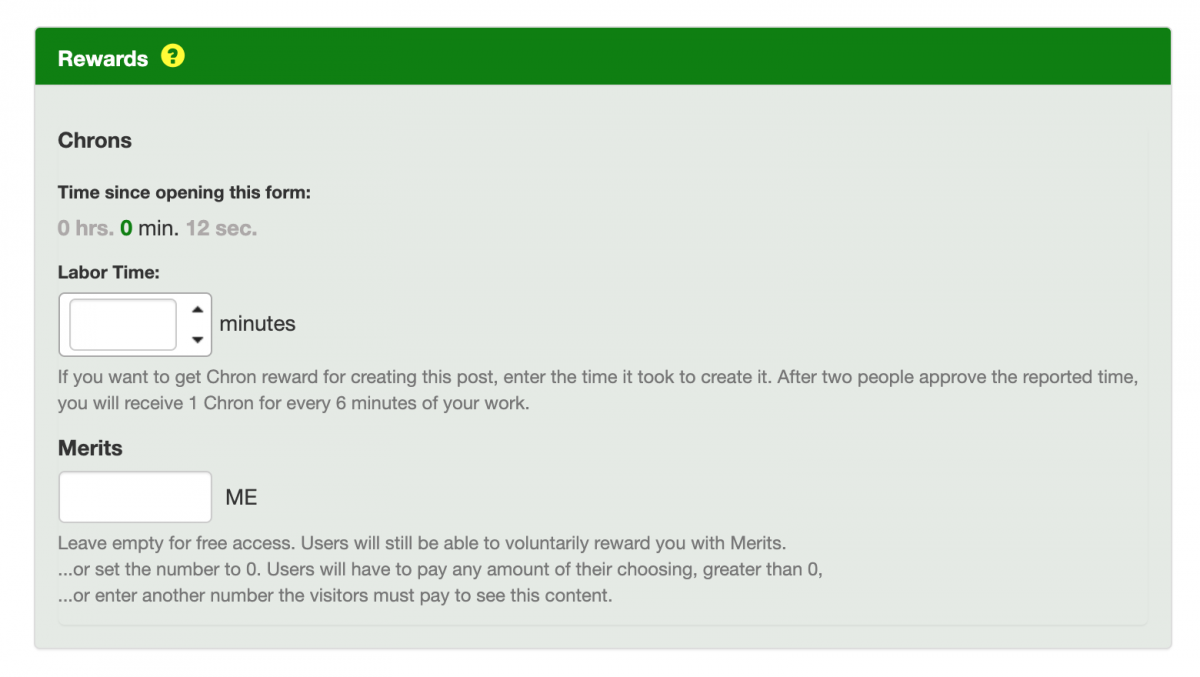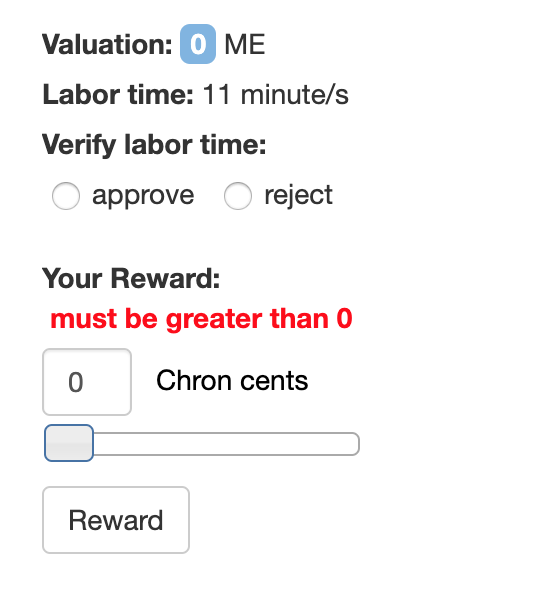 Please note that the functionality described in this post aims to support any community work. It does so by recognizing that people who do not contribute content to this portal might be contributing to other community-beneficial projects or activities, such as wikipedia, helping old or disabled people, or creating open source programs. Recognition of such work is mediated by the community currency described below. The aim of this initiative is therefore not an economic enrichment, but an increase in the production of goods and services beneficial to the community.
Please note that the functionality described in this post aims to support any community work. It does so by recognizing that people who do not contribute content to this portal might be contributing to other community-beneficial projects or activities, such as wikipedia, helping old or disabled people, or creating open source programs. Recognition of such work is mediated by the community currency described below. The aim of this initiative is therefore not an economic enrichment, but an increase in the production of goods and services beneficial to the community.
Summary
- Starting in the summer of 2019 contributors to this portal can receive not only "moral" but also economical reward,
- we adopted the reward mechanism of the community economic system NEO, by utilizing functions of its application Rovas, built directly into this portal,
- use of the new rewarding functions is voluntary - contributors can continue publish their posts for free,
-
NEO has two kinds of rewards:
- economic - in the form of community currency Chron (from greek Chronos = time). Every hour of work earns 10 Chrons,
- value (or reputation) - is measured in Merits, which authors receive only if somebody rewards their work with Chrons,
- all information in NEO is visible to its participants, to enable crowdsourced oversight and prevent abuse of the system.
How it works
-
 If a content author is interested in Chron reward, he/she specifies in the content form the time it took to create the post,
If a content author is interested in Chron reward, he/she specifies in the content form the time it took to create the post, - to earn the Merit reward, the content must be rewarded by other users with Chrons. The content form therefore also contains the "Merits" field, where the author enters the amount of Chrons others must pay to see the post. If the field is left blank, anybody can view it, even the anonymous users. When "0" is entered, users must pay some amount of Chrons of their choosing, greater than 0. Lastly, the author may enter a fixed amount users must pay, to read the post,
-
after saving the form, the time entered must be verified by two other users. As a reward for verifying, they do not have to reward the report with own Chrons to read it,

- after the reported time is approved, Rovas grants the content author the economic reward, one Chron for every 6 minutes reported,
- Finally, the Merit reward is granted to the content author by Rovas if somebody rewards the content with Chrons. The Chrons paid are destroyed by Rovas, but the rewarded content author receives Merits reward equal to the amount of Chrons paid. For example, if the content is rewarded with 0.2 CH, its author receives 0.2 ME and the 0.2 CH is destroyed. The liquidation of Chrons ensures automatic regulation of the optimal amount of currency in circulation and also enforces community character of the system, since non one can economically profit from the system and liquidation of a part of the money increases value of the Chros that remain in circulation.
In detail
After 10 years of operation as a crowdsourced, free-for-all portal for cross-coutry ski enthusiasts, Na bezky! and our new portal for cyclists Cyklonaut will operate as projects, governed by the "community principle", which means that:
- community content is created and marked as such by its authors,
- only community members have access to community content,
- community content can be accessed by rewarding its authors with Chrons - the community currency,
- Chrons can be earned by any (actually performed) work that the worker him/herself considers potentially useful to the community. The product of such work must be possible to reward/purchase with Chrons. Detailed rules of the NEO system can be found following the links given above.
- community members determine social value of the content by rewarding it (and therefore it's author) with numeric score, called Merit.
This decision is driven by a belief, that making content avaliable only to users who also somehow contribute to the community will increase engagement in pro-social projects. An experiment performed here during the 2017-18 winter season seems to confirm this belief, as the table below suggests.
| parameter | 2014-15 | 2015-16 | 2016-17 | 2017-18 | 2018-19 |
| Number of visitors | 32 371 | 27 049 | 44 896 | 39 866 | 35 235 |
| New users | 179 | 333 | 526 | 1 221 | 449 |
| Number of reports | 318 | 270 | 561 | 1 126 | 634 |
| Number of reporters | 89 | 74 | 121 | 232 | 130 |
| time period for every season is from 1. November to 19 March | |||||
Please note that only during the 2017-18 season did the portal run the experiment with community content. During that season the number of reports doubled in comparison with the previous year, the number of geographic regions where the reports originated also grew at a similar rate and almost 130 people paid total of 573 euros for "points" - the "currency" used in the experiment. This suggest that the points had a real economic (exchange) value from the start and Chron consequently should not be different in this respect.
The community economic system NEO has its own web application Rovas, functions of which were added into this portal as its reward mechanism. Users of our portal need therefore an account in Rovas, which the new users can have created during registration by checking a check box on the registration form. The existing users can create Rovas accounts by simply clicking a button provided in the report-creation form and some other places. It is expected, that users will want to earn Chrons also for activities other than writing reports or articles in our portals. For example, the individuals who create and maintain ski/bicycle trails would need to file reports about their activities directly in Rovas to earn Chrons.
One of the more interesting features of Rovas is the ability of a project owner to designate as beneficiaries receving Merit reward for his/her project other people (or even other projects) besides him/herself. For example, this portal will collect 3 % of every reward made in the portal and use it to reward the Na bezky/cyklonaut Rovas project with Merits. The project owners decided, that that reward will be granted not only to themselves, but also to any user who helps to provide new or improves existing content in this portal. In Rovas terminology, such beneficiaries are called "shareholders." The Merit benefits received by the contributors will be proportional to the time they invested into improving the portal.
* in Slovak, Czech "rovas" stands for english "tally stick"